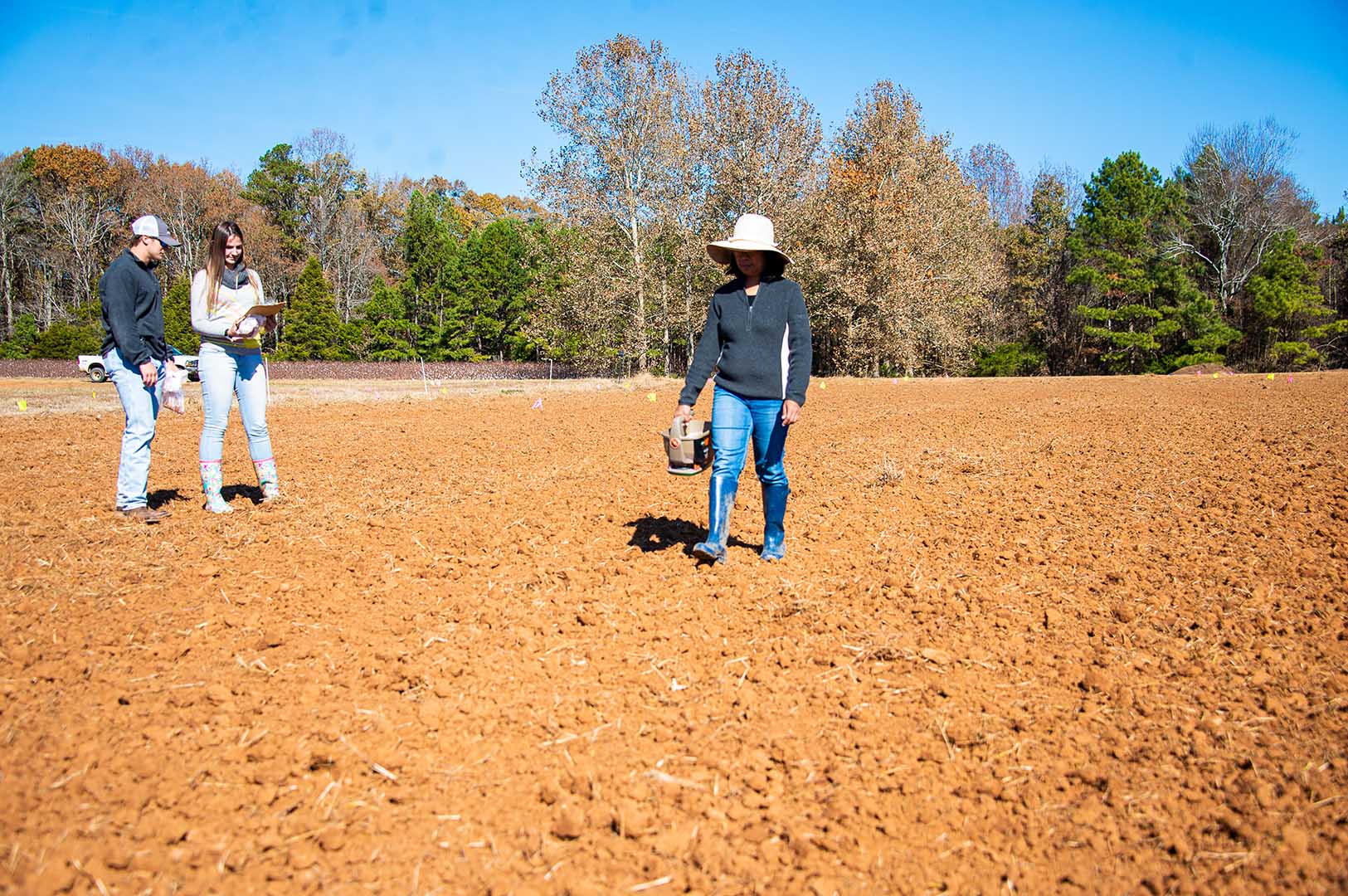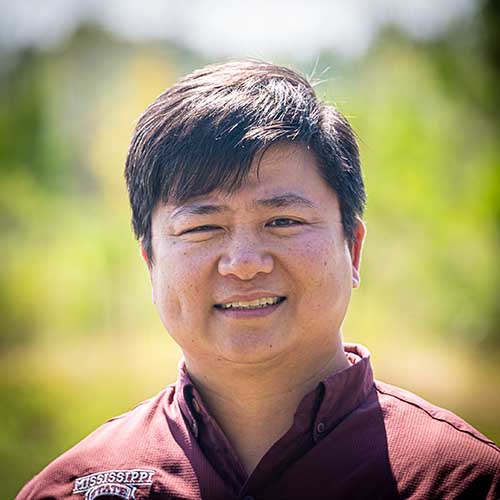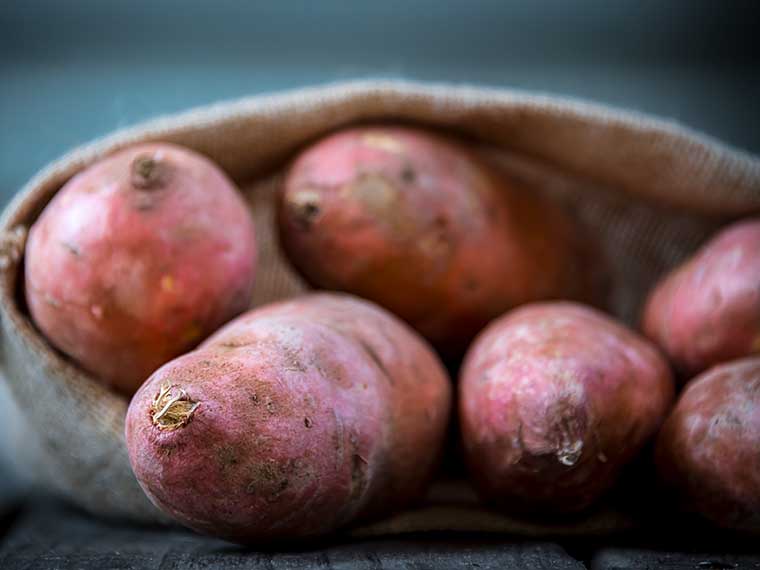Rooting out the Weeds
How sweet potato cultivars combined with cover crops might help suppress weeds
By: Vanessa Beeson
The information presented on this page may be dated. It may refer to situations which have changed or people who are no longer affiliated with the university. It is archived as part of Mississippi State University's history.
Mississippi is a leading sweet potato producer nationally, ranking second in acreage and third in production, consistently. In 2018, 29,000 acres were harvested across 89 farms generating $118 million in production value. Unfortunately, sweet potatoes are susceptible to problematic weeds that can cause yield reductions up to 90 percent. MAFES researchers are using cover crops and the sweet potato crop itself to help combat this problem.
Dr. Te-Ming Paul Tseng, MAFES weed scientist and assistant professor in the Department of Plant and Soil Sciences, is working to identify weed-suppressive sweet potato cultivars and cover crop strategies that could enhance the profitability and adoption of organic sweet potato production.
The two-year project focuses on developing a comprehensive weed management system for organic sweet potatoes by identifying allelopathic sweet potato varieties and integrating them with cover crops and herbicides approved by the Organic Materials Review Institute, or OMRI. Allelopathy is when an organism produces biochemicals that influence germination, growth, survival, and reproduction of other organisms.
"The main goal of this project is to select sweet potato varieties with weed-suppressive traits that can help control major weeds affecting organically grown sweet potato. These weeds include yellow and purple nutsedge, annual grasses, common cocklebur, and pigweed species," Tseng said.
He pointed out that while weed control in both conventional and organic sweet potato systems proves cumbersome, to say the least, it's especially arduous in organic production.
"Unfortunately, the majority of the sweet potato farms in Mississippi are exposed to problematic weeds that can cause yield reduction of up to 90 percent, if not controlled. Weed control options in organic sweet potato are limited. Hand-weeding is labor intensive and ineffective on perennial nutsedges. Plastic mulching increases cost and may increase soil temperature, if not laid properly," Tseng said.
The team analyzed 31 sweet potato cultivars from all over the world and identified two that demonstrated allelopathic mechanisms.
"We conducted greenhouse and field screenings to determine which of the cultivars demonstrated the biological mechanism to suppress weeds. We are now breeding the two varieties to enhance this mechanism," Tseng said.
From the greenhouse and field screenings to identify allelopathic sweet potato varieties against Palmer amaranth, the team found two out of 31 varieties that inhibited Palmer amaranth growth by up to 80 percent. From there, the team's analysis revealed three compounds-coumarin, chlorogenic acid, and hydroxycinnamic acid-present in higher levels in allelopathic than compared to non-allelopathic phenotypes.
The researchers then tested the allelopathic varieties in an integrative system that included various overwintering strategies including the use of cover crops.
These sweet potato varieties will be tested in the field to evaluate the level of weed suppression and integrate it with weed-suppressive cover crop and OMRI-approved herbicides.
These varieties will also be compared with standard, conventional commercial practices, to determine the relative profitability and overall sustainability of the alternative system utilizing weed-suppressive varieties and cover crops for organic growers.
"We found that a combined cover crop of rye and vetch reduced Palmer amaranth by 70 percent while fallow fields in the winter were best at keeping down nutsedge densities," said Tseng, who pointed out that the study would be repeated this year to confirm the findings.
Tseng said he is most excited about the possibility of breeding sweet potato varieties designed to help suppress weeds.
"I am excited that the weed-suppressive accessions identified from this study can potentially be used in a sweet potato breeding program to develop varieties with weed suppressive abilities against problematic weeds such as yellow nutsedge and Palmer amaranth," he said.
Tseng pointed out some of the advantages of allelopathic sweet potato and cover crops in sweet potatoes.
"These two practices are sustainable with minimal adverse effects on the environment and minimal dependency on chemicals, including herbicides for organic production. Implementing these into a current weed management program in organic sweet potatoes should also prevent further evolution of herbicide-resistant weeds," he said.
The research is funded by the Mississippi Department of Agriculture and Commerce and USDA Agricultural Marketing Service Specialty Crop Block Grant Program. Dr. Stephen Meyers, assistant professor at Purdue and former associate research and extension professor at MSU, served as co-investigator on the research. Dr. Mark Shankle, research professor at the Pontotoc Ridge-Flatwoods Branch Experiment Station, is also assisting in the research.
The project inspired the researchers to apply for funding through the USDA Organic Agriculture Research and Extension Initiative, which has been granted and will begin in January 2020. That project will focus on developing a multifaceted approach to production methods and pest management in organic sweet potato systems and will allow the team to expand the project to a national scope. In addition to MSU, collaborators will include Purdue University, the University of Arkansas, and North Carolina State University.
In addition to this study, MAFES scientists are also studying the effects of cover crops for weed control in soybean and corn.
Allelopathic sweet potato and cover crops suppress weeds with minimal adverse effects on the environment and minimal dependency on chemicals, including herbicides for organic production.
Dr. Te-Ming Paul Tseng

Undergraduate student Andrew Nuss, Brazilian exchange student Isabel Werle, and Ph.D. student Loida Perez plant cover crops at the Pontotoc Ridge-Flatwoods Branch Experiment Station. In the spring, the cover crops will be terminated and sweet potatoes will be planted. Researchers hope to determine which sweet potato cultivars and which cover crops can symbiotically better fight problematic weeds. (Photo by Dominique Belcher)
Behind the Science

Te-Ming Paul Tseng
Associate Professor
Education: B.S., Chemistry, Zoology, Biotechnology, Bangalore University; M.S., Biotechnology, Allahabad Agricultural University; Ph.D., Cell & Molecular Biology in Weed Science, University of Arkansas
Years At MSU: 10
Focus: Sustainable weed management, including novel weed control methods, herbicide resistance mechanisms, enhancing crop tolerance, and understanding the physiology of stress responses in weeds
Passion At Work: I pursue this research to develop resilient, eco-friendly weed management strategies that reduce environmental impact and boost crop productivity.

